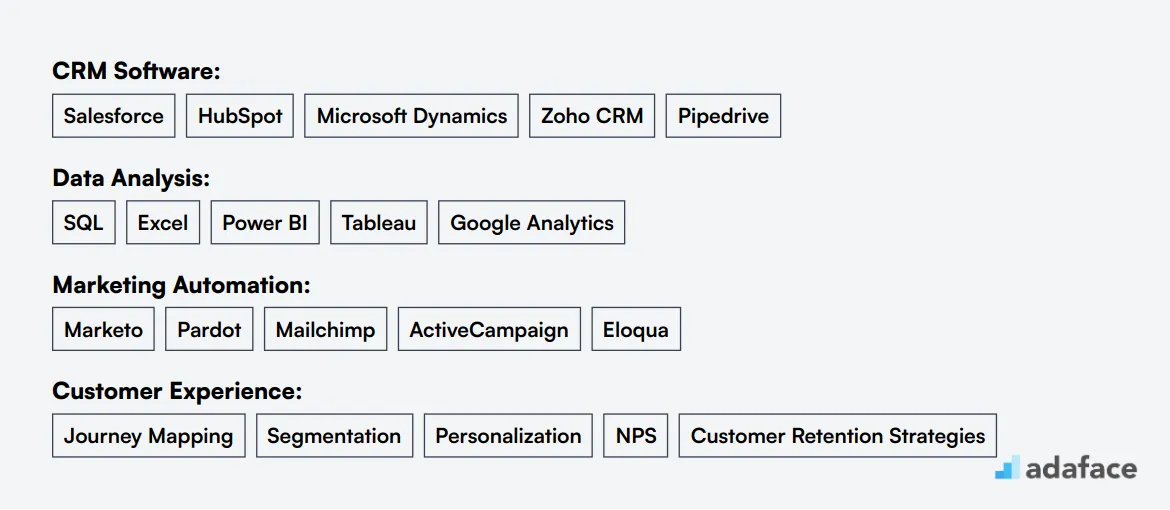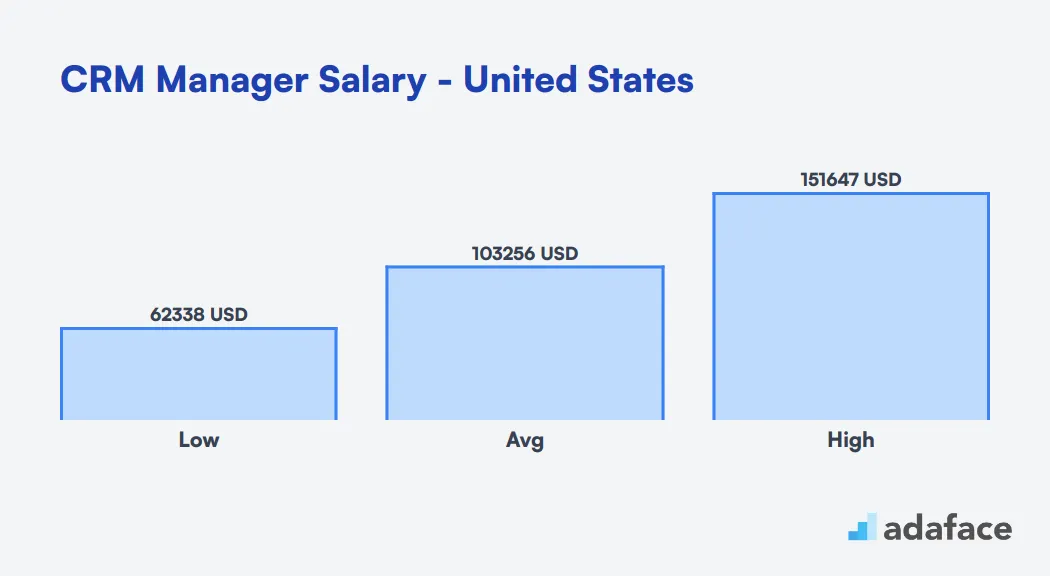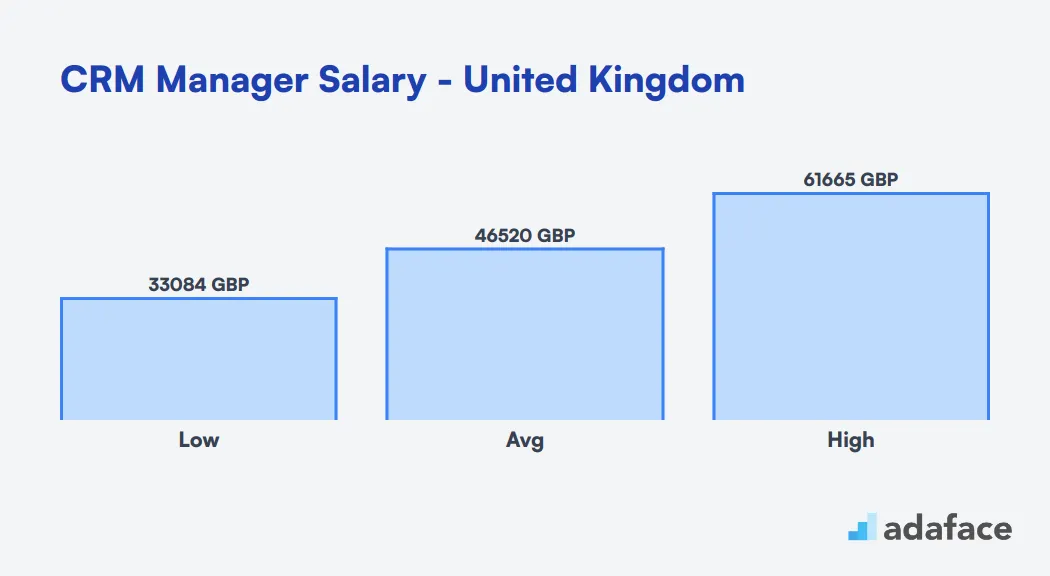Recruiting a skilled CRM Manager is a critical task for companies aiming to boost customer relationships and drive revenue growth. Many organizations underestimate the complexity of this role, often focusing solely on technical skills while overlooking the strategic and leadership qualities required. A top-notch CRM Manager needs to balance technical expertise with business acumen, communication skills, and the ability to drive adoption across teams.
This comprehensive guide will walk you through the process of hiring an exceptional CRM Manager, from defining the role to conducting effective interviews. We'll cover key skills to look for, crafting an attractive job description, and utilizing assessment tests to evaluate candidates objectively.
Table of contents
CRM Manager Hiring Process
The CRM Manager hiring process typically takes around 4-6 weeks. Here's a quick overview:
- Define the job description and advertise the role.
- Screen resumes and conduct initial phone interviews.
- Administer skill assessments and case studies to evaluate technical abilities.
- Conduct in-person interviews with the most promising candidates.
- Extend an offer to the top candidate.
Let's dive into each step in more detail.
Key skills and qualifications for a CRM Manager
Creating the ideal candidate profile for a CRM Manager can be tricky. The role often varies across organizations, with some skills being must-haves for one company but merely preferences for another. It's important to distinguish between required and preferred qualifications to attract the right talent pool.
When building your candidate profile, consider using skills assessment tools to evaluate potential candidates objectively. This can help you identify those who truly possess the necessary skills for success in the role.
Here are some common required and preferred skills and qualifications to consider for a CRM Manager position:
| Required skills and qualifications | Preferred skills and qualifications |
|---|---|
| Bachelor's degree in Business, Marketing, or related field | Master's degree in Business Administration or related field |
| 3+ years of experience in CRM management or similar role | Certification in CRM platforms (e.g., Salesforce Administrator) |
| Proficiency in CRM software (e.g., Salesforce, HubSpot, Microsoft Dynamics) | Experience with marketing automation tools |
| Strong analytical and data interpretation skills | Knowledge of data privacy regulations (e.g., GDPR, CCPA) |
| Excellent communication and stakeholder management abilities | Project management experience |
How to Write an Effective CRM Manager Job Description
Creating a compelling CRM Manager job description is key to attracting top talent. Here are some tips to help you craft a standout listing:
- Highlight key responsibilities: Clearly outline the role's main duties, such as developing CRM strategies, managing customer data, and driving customer engagement initiatives.
- Balance technical and soft skills: List required technical skills like CRM software proficiency, but also emphasize soft skills such as communication, leadership, and problem-solving abilities.
- Showcase growth opportunities: Highlight potential for career advancement, ongoing training, and the chance to work with cutting-edge CRM technologies.
- Include industry-specific requirements: Mention any relevant certifications, years of experience, or industry knowledge that would be valuable for the role.
Top Platforms to Hire CRM Managers
Now that we have a job description for the CRM Manager role, it’s time to list it on various job listing sites to attract suitable candidates. Utilizing the right platforms can significantly enhance your chances of finding the ideal fit for your organization.
Some of the most popular platforms to consider include LinkedIn, where you can target professionals already working in CRM roles, and Indeed, a well-known job board with a vast reach. Additionally, Glassdoor offers insights into company culture, which can help attract candidates who align with your values. Other excellent options include specialized job boards and industry-specific platforms that cater to CRM professionals, ensuring a focused approach in your hiring efforts.
Keywords to Look for in CRM Manager Resumes
Resume screening is a key step in finding the right CRM Manager. It helps you quickly identify candidates with the most relevant skills and experience before diving into interviews.

When manually screening resumes, focus on key terms like CRM software names (Salesforce, HubSpot, Microsoft Dynamics), data analysis tools (SQL, Excel, Power BI), and customer experience concepts. Look for skills required for CRM managers such as strategic planning and data-driven decision making.
To streamline the process, consider using AI-powered tools or language models. These can quickly scan multiple resumes, matching them against your job requirements and providing you with a shortlist of top candidates.
Here's a sample prompt for AI-assisted resume screening:
TASK: Screen resumes for CRM Manager role
INPUT: Resumes
OUTPUT:
- Candidate name and email
- Matching keywords
- Score (out of 10)
- Recommendation
- Shortlist (Yes/No/Maybe)
KEYWORDS:
- CRM Software (Salesforce, HubSpot, Microsoft Dynamics)
- Data Analysis (SQL, Excel, Power BI)
- Marketing Automation
- Customer Experience
- Strategic Planning
Recommended skills tests to screen CRM Managers
To ensure you are hiring the right CRM Manager, it's important to assess their skills thoroughly. Skills tests provide a reliable way to evaluate candidates' knowledge and abilities, going beyond what resumes and interviews can reveal. Here are our top recommendations for skills tests from the Adaface library that can help you assess your CRM Manager candidates effectively.
Microsoft Dynamics 365 Customer Service Functional Consultant Test is designed to assess candidates' understanding of customer service processes within the Dynamics 365 framework. This test is suitable for evaluating their ability to implement, manage, and maintain CRM solutions effectively.
Microsoft Dynamics 365 Sales Functional Consultant Test focuses on a candidate's capacity to manage sales cycles and maintain customer relationships using Dynamics 365. This test helps ensure that your prospective CRM Manager can leverage the platform to enhance sales processes.
Microsoft Power Platform Functional Consultant Test evaluates a candidate's skills in utilizing the Power Platform to automate business processes and create efficient workflows. This is critical for CRM Managers, who often need to streamline operations and improve customer engagement.
For a broader assessment of technical skills, the Microsoft Dynamics 365 Core Finance and Operations Test is ideal. It assesses candidates' ability to integrate finance operations with CRM systems, ensuring that they can manage and optimize business functions cohesively.
Finally, consider the Microsoft Power Platform Developer Test to gauge candidates' proficiency in customizing and extending CRM solutions. As CRM Managers often need to tailor systems to meet specific business needs, this test provides insights into their development and customization skills.
Case Study Assignments to Evaluate CRM Manager Candidates
Case study assignments can be effective for assessing CRM Manager skills, but they come with drawbacks. These include lengthy completion times, lower candidate participation rates, and the risk of losing qualified applicants. Despite these challenges, well-designed case studies can provide valuable insights into a candidate's abilities.
CRM Implementation Strategy: This case study asks candidates to develop a plan for implementing a new CRM system across a mid-sized company. It tests their ability to manage complex projects, understand business needs, and coordinate with various departments.
Customer Retention Analysis: Candidates analyze customer data to identify churn risks and propose retention strategies. This assignment evaluates their data analysis skills, customer insight, and ability to create actionable recommendations to improve customer relationships.
Sales Pipeline Optimization: In this scenario, candidates review a company's sales pipeline and suggest improvements to increase conversion rates. It assesses their understanding of sales processes, CRM tool utilization, and ability to align sales and marketing efforts for better results.
How to Structure the Interview Stage for CRM Manager Candidates
After candidates pass the initial skills tests, it's time for technical interviews to assess their hard skills in depth. While skills tests are great for initial screening, technical interviews are key to finding the best fit for your CRM Manager role. Let's look at some sample interview questions to help you evaluate candidates effectively.
Consider asking: 'Can you describe your experience with CRM software?' This gauges their practical knowledge. 'How do you approach data analysis for customer insights?' reveals their analytical skills. 'What strategies have you used to improve customer retention?' shows their strategic thinking. 'How do you handle conflicts between sales and customer service teams?' assesses their leadership abilities. 'Can you walk us through a successful CRM implementation you've led?' demonstrates their project management skills.
Cost of Hiring a CRM Manager
The cost of hiring a CRM Manager varies widely based on experience, location, and company size. In the United States, the average salary range for CRM Managers is between $62,339 and $151,648, with a median of $97,229.
Keep in mind that total compensation may include bonuses, benefits, and stock options. Additionally, costs can increase in competitive markets like Washington, DC, San Francisco, and New York, where salaries tend to be higher than the national average.
CRM Manager Salary in the United States
The average salary for CRM Managers in the United States ranges from $62,339 to $151,648, with a median of $97,229. Salaries can vary based on location, experience, and company size.
Top-paying cities include Washington, DC (median $127,557), San Francisco, CA (median $117,922), and Dallas, TX (median $114,001). New York and Los Angeles also offer competitive salaries, with medians around $110,000.

CRM Manager Salary United Kingdom
In the United Kingdom, a CRM Manager earns an average salary of around £45,000 per year. Entry-level positions may start at approximately £35,000, while those with more experience or working in larger companies can earn upwards of £60,000. Salaries may vary depending on location, industry, and company size.

What's the difference between a CRM Manager and an Email Marketing Manager?
People often mix up CRM Managers and Email Marketing Managers because both roles revolve around customer engagement and retention. However, they hold distinct responsibilities and expertise within a business's marketing strategy.
A CRM Manager focuses on the overall CRM strategy and customer retention by analyzing data such as customer lifetime value and churn rate. They work closely with sales and customer service teams, using tools like Salesforce and HubSpot. Their role requires strong analytical skills and data management expertise, usually backed by 3-5 years of CRM experience.
In contrast, an Email Marketing Manager is dedicated to crafting and executing email campaign strategies to boost email engagement. They concentrate on metrics like open rates and click-through rates, collaborating with content creators and designers. Their toolkit includes platforms like Mailchimp and Constant Contact, and they typically possess 2-4 years of email marketing experience, emphasizing copywriting and design skills.
For a deeper understanding of the skills required for a CRM Manager, you might find this blog insightful.
| CRM Manager | Email Marketing Manager | |
|---|---|---|
| Primary Focus | Overall CRM strategy | Email campaign strategy |
| Key Responsibilities | Customer segmentation, Retention | Email design, A/B testing |
| Tools Used | Salesforce, HubSpot | Mailchimp, Constant Contact |
| Metrics Analyzed | Customer lifetime value, Churn rate | Open rate, Click-through rate |
| Collaboration With | Sales, Customer service | Content creators, Designers |
| Required Skills | Analytical skills, Data management | Copywriting, Design skills |
| Experience Level | 3-5 years in CRM | 2-4 years in email marketing |
| Objective | Customer retention and satisfaction | Increasing email engagement |
What are the ranks of CRM Managers?
CRM Manager roles can vary across organizations, leading to confusion about their hierarchy. Let's break down the common ranks of CRM Managers to clarify their progression and responsibilities.
- Junior CRM Manager: This entry-level position focuses on day-to-day CRM operations. They handle basic data management, generate reports, and support senior team members.
- CRM Manager: At this level, managers oversee CRM strategies and implementations. They work closely with sales and marketing teams to optimize customer relationships and CRM systems.
- Senior CRM Manager: These professionals lead CRM initiatives across departments. They develop long-term strategies, manage budgets, and often supervise junior team members.
- Head of CRM: This role involves overseeing all CRM operations within an organization. They shape company-wide CRM policies and collaborate with C-level executives to align CRM strategies with business goals.
- Director of Customer Relationship Management: At the highest level, directors are responsible for the overall CRM vision. They make critical decisions about CRM technologies, vendor relationships, and integration with other business systems.
Hire the Best CRM Managers
We've covered the key aspects of hiring a CRM Manager, from understanding the role to crafting job descriptions and conducting interviews. The process requires attention to detail and a clear understanding of your company's CRM needs.
The most important takeaway is to use well-defined job descriptions and skills tests to make your hiring process more accurate. By focusing on these elements, you'll be better equipped to find the right CRM Manager who can drive your customer relationship strategies forward.
Microsoft Dynamics 365 Customer Service Functional Consultant Test
FAQs
Key skills for a CRM Manager include CRM software expertise, data analysis, strategic planning, project management, communication, and leadership. They should also have a strong understanding of customer relationship principles and business processes.
You can assess CRM skills through a combination of methods, including skills assessment tools, case study assignments, and targeted interview questions. Consider using CRM-specific tests to evaluate technical proficiency and problem-solving abilities.
Look for CRM Manager candidates on professional networking sites like LinkedIn, job boards specializing in tech and marketing roles, and CRM user groups or forums. Additionally, consider reaching out to CRM software vendors for referrals or attending industry conferences.
A comprehensive CRM Manager job description should include responsibilities, required qualifications, desired skills, and information about your company's CRM environment. Highlight both technical and soft skills, and emphasize the strategic importance of the role within your organization.
The hiring process for a CRM Manager can take anywhere from 4 to 8 weeks, depending on your company's recruitment procedures and the availability of qualified candidates. This timeline includes initial screening, assessments, interviews, and final decision-making.
Ask a mix of technical, situational, and behavioral questions. Focus on their experience with specific CRM systems, strategies for improving adoption rates, handling data privacy, and managing cross-functional teams. You can find relevant examples in our CRM Manager interview questions guide.
To assess cultural fit, include team members in the interview process, ask questions about work style and values, and consider using personality assessments. Additionally, provide candidates with information about your company culture and observe how they respond to and engage with this information.

40 min skill tests.
No trick questions.
Accurate shortlisting.
We make it easy for you to find the best candidates in your pipeline with a 40 min skills test.
Try for freeRelated posts
Free resources



